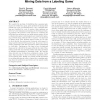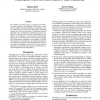124 search results - page 7 / 25 » Preference Elicitation without Numbers |
239
click to vote
Publication
We generalise the problem of inverse reinforcement learning to multiple tasks, from multiple demonstrations. Each one may represent one expert trying to solve a different task, or ...
119
click to vote
WWW
2009
ACM
16 years 3 months ago
2009
ACM
We consider the problem of identifying the consensus ranking for the results of a query, given preferences among those results from a set of individual users. Once consensus ranki...
111
click to vote
AAAI
2006
15 years 3 months ago
2006
We establish a declarative theory of forgetting for disjunctive logic programs. The suitability of this theory is justified by a number of desirable properties. In particular, one...
UAI
2001
15 years 3 months ago
2001
We propose a directed graphical representation of utility functions, called UCP-networks, that combines aspects of two existing preference models: generalized additive models and ...
111
click to vote
ISPW
2008
IEEE
15 years 8 months ago
2008
IEEE
Most process models calibrate their internal settings using historical data. Collecting this data is expensive, tedious, and often an incomplete process. Is it possible to make acc...


